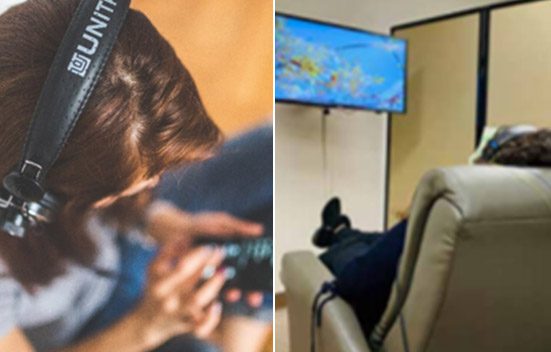Overeating in the US
38% percent of adults say they have overeaten or eaten unhealthy foods in the past month because of stress. Almost half of adults (49 percent) report engaging in these behaviors weekly or more. Jan 1, 2024
Why Do We Eat More Than Our Body Can Use?
There are multiple reasons or causes of overeating, some related to the foods themselves, and others related to why or when we’re eating. In America, most people eat for reasons other than hunger. These causes of overeating include:
- Emotional eating. You’re more likely to eat in times of stress, or if you’re in a bad mood, tired, bored, or sad.
- Other people also overeat because of certain habits, such as eating while distracted or eating too quickly.
One way to help is to try making a list of things that trigger overeating and then coming up with ways to avoid or address them.
Do you want to try something new? Have you heard of light therapy? We would recommend you to buy SP6 COMPLETE patches to limit cravings and support hormones. Research shows that these patches improve the function of the liver, pancreas, kidneys, thyroid, intestine, hypothalamus, the adrenals. This could be an effective complementary tool. Link here…
What happens to my body when you eat too much?
Eating too much food requires your organs to work harder. When you overeat, your body secretes extra hormones and enzymes to break the food down. To break down food, the stomach produces hydrochloric acid. If you overeat, this acid may back up into the esophagus resulting in heartburn.
Is it true that the more I eat, the more I’ll want to eat?
The more you eat, the more your inflated needs grow, while the increased metabolism of ballast reduces your nutrient stores. That, in turn, increases your hunger and search for ‘fast’ food that can quickly satisfy you (in a short time, for a short time).
Why do I still feel hungry when I’m done eating?
You may feel hungry after eating due to a lack of protein or fiber in your diet. Other causes may include not eating enough high-volume foods and hormone issues like leptin resistance, or behavioral and lifestyle choices.
Why do I crave food when I am full?
With leptin resistance, the brain does not recognize leptin’s signals, leading to persistent feelings of hunger which can trigger the desire to eat even when full.
If you struggle with the persistent question — Why can’t I stop eating when I’m full? If you have already talked to your doctor about it, try something new. Book a complimentary appointment with us.
Food and emotions: Why some people eat too much
America has a weight problem. In the U.S., about 4 in 10 adults over age 20 are classified as obese. It is estimated that more than 130 million adults in the U.S. now have diabetes or prediabetes – and the trend shows no signs of slowing down.
Overeating is at the heart of this troubling trend. And, in some cases, you may overeat as a desperate attempt to answer emotional needs.
How can I address my emotional needs in healthier ways?
Depending on your lifestyle and what you do for work, the way that will be most effective to help with over eating or an eating disorder will vary from person to person. With patients that we’ve worked with in the past, this is what we have found to be some of the most helpful tips:
- Look for responses to emotional discomfort other than food. The next time you’re feeling blue, take a long walk outside. Exercise can elevate your mood by changing your body’s chemistry. So can sunshine.
- Address your feelings. Be willing to recognize and address unpleasant emotions instead of staying away from them with distractions, such as eating.
- Stop and think before you dig into that next bowl of ice cream. Ask yourself: “Do I really want to eat this? Am I even hungry?”
- Keep an eating journal to write down your daily food intake. This will help you become more conscious of your eating patterns.
- Adjust your diet. Eating healthy foods can help decrease stress and even out your moods.
- Seek professional help if you don’t feel confident about your ability to stop overeating. Make an appointment with a therapist who treats people who have eating disorders.
Remember: You’re not alone! Millions of other Americans struggle with this problem. Do not feel guilty, just book a complimentary appointment, we can help!
Can Neurofeedback Help With Overeating
Research has shown that Neurofeedback sessions, specific to your own life story, can be an effective treatment for individuals struggling with overeating and obesity.
Much research including the pilot study conducted by the Sheba Medical Center in Israel reported that “neurofeedback holds a promising potential as a feasible neurofeedback platform for modulation of cortical brain circuits involved in self-control and eating behavior”…”
Another study found that people who received neurofeedback training for weight loss experienced significant changes in their brainwave activity, stress response, and mood disorders. Participants in the control group who did not receive neurofeedback therapy did not show the same changes in these areas.
Additionally, a recent German study of adults with binge-eating disorders showed that neurofeedback, “significantly reduced objective binge-eating episodes, global eating disorder psychotherapy, and food craving. Approximately one-third of participants achieved abstinence from objective binge-eating episodes after brain training”.
All in all, research has indicated that neurofeedback is a valuable tool for weight loss. It can help reduce cravings, food intake, and stress-related eating, as well as improve the quality of life. Plus, it often also brings about positive changes in brainwave activity. Our clients report deep feelings of deep and lasting Inner Peace!
What about anorexia?
Neurofeedback improves the circumstances of clients with anorexia, says a recent 2017 review study from King’s College in London. Neurofeedback researchers look to provide a solution for a potentially life-threatening mental health problem.
LET’S TRY SOMETHING NEW!
WE HAVE THE EASIEST WAY FOR YOU TO OVERCOME THESE BAD EATING HABITS.
If your eating disorders are not successfully treated via traditional psychological therapies, if you are among those for whom such techniques proved ineffective, Neurofeedback with our tailored programs, is your solution.
Neurofeedback brain training program, particularly our personalized programs, is recognized as an effective treatment for a variety of mental health discomforts or disorders, chronic pain, and anxiety disorders. Neurofeedback can also help with weight loss by rewiring your brain and improving its functions.
Neurofeedback brain training is a non-invasive and drug-free treatment that aims to improve your brain function by following your brain waves live and helping the brain to improve them with accurate precision. By providing feedback to your brain, based on real-time changes in its electrical activity, these feedbacks help the brain recognize and adjust its patterns of activity.
Do not hesitate to give us a call or book a complimentary appointment through our website MyOptimalBrain.com to see how we can help you.
We are here to help! Happy Summer time!
InnerOptimal Team





